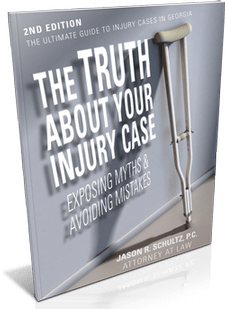Step Three: Whether the Landowner was Negligent
Under Georgia law, there are several elements of property owner liability, and we have to prove each:
- There was a dangerous condition on the property, and
- The owner knew or should have known about the hazard, and
- The owner did not correct or provide sufficient warnings about the situation, and
- The hazard caused your accident, injuries, and damages.
Step Four: What Caused Your Accident and Injuries
If your slip and fall accident met the elements that establish landowner negligence, and that negligence caused your injuries, we can pursue a personal injury claim against the owner. If there was a hazard on the property, but something else caused your fall, the owner is not liable.
Let’s say that you were walking to your table in a restaurant. Another patron told the server that there was a small spill of oil on the floor. The server ignored the warning and did not clean up the spill. If you slid on the oil and fell, sustaining an injury, the restaurant may be liable. The restaurant knew about a hazard and did not wipe up the oil. You fell and got hurt because of the negligence.
Step Five: Whether You Were Also Negligent
People walk around in a state of distraction today. People are texting and performing other functions on their cell phones without looking where they are going. If you were partly negligent, Georgia’s rule on comparative fault will reduce the amount of money you get in proportion to the percentage of your negligence, but you can still collect damages from the responsible party.
Call the Law Office of Jason R. Schultz, PC today at 404-474-0804 today, to get your free consultation about your premises liability case.


